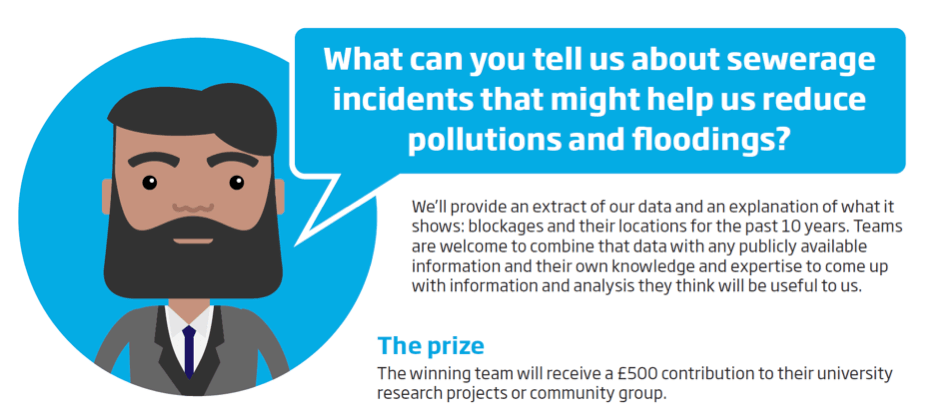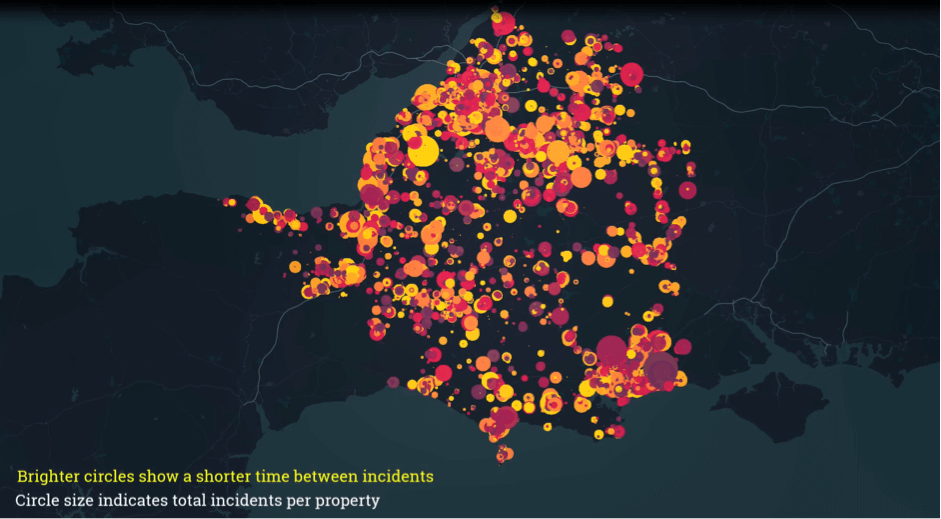- Marketplace
- Blog
- Our Marketplace hackathon event
 A post by Laura Mann
A post by Laura Mann
Head of open systems
In autumn 2018 we ran a series of ‘data hackathons’, inviting internal and external staff to explore a data set detailing customer blockages over the past six years.
We posed the question, ‘What can you tell us about sewerage incidents that might help us reduce pollutions and floodings?’
The result was an interesting look into a data set stretching over several years, with statistics flagging themes in the data, and the demonstration of a previously unknown visualisation tool.
We ran two separate hackathons – one for internal staff, allowing those interested from around the business to explore an unknown data set over pizza one evening, and a separate event focused on external teams.
The internal strand saw 12 individuals from across the business getting to grips with the data set and seeing what they could identify. With a mix of knowledge, the findings were varied – socio-economic links were explored, hot spots identified and trends with weather confirmed.
One interesting route was comparing the screenings’ volumes from similar water recycling centres – could a reduction in volume indicate an increasing blockage upstream?
The impact of flushing sanitary products such as tampons was considered – with wet wipes having had until recently the lion’s share of blockages attention, could sanitary waste be an equal contributor?
The groups then presented to senior managers across the business before a winning team was announced. Enjoyed by all, this hackathon produced several lessons which will influence how we run similar events in the future – and has identified ways in which we can improve our data collection.
The external strands saw teams from Exeter and Bristol Universities compete against local group Bath Hacked. Over a month, teams were able to review the data and analyse it in any way they saw fit to see what they could tell us about pollutions and blockages.
Then they presented their results to Matt Wheeldon, Director of assets and compliance, George Taylor, Director of waste water, and Aimee Shaw, Head of water resources and behaviour engagement.
The teams’ reviews varied according to the different areas focused on. Socio-economic data, age and gender densities were mapped to see if there was a correlation and whether campaigns could target different communities.
Common types of incidents and their link to weather were considered, as well as the action taken. Comparison to cultures in other countries was also reviewed and whether this might be an indication of causes of blockages.
The winning team was Bath Hacked, who used a mapping tool released by Uber to give an impressive view of the blockages over time – hotspots, causes and repeat instances appeared as visualisations on a map of the region.

Bath Hacked won a £500 prize towards the hackathons they run. The other teams were thanked for their efforts with vouchers.
As the organiser I couldn’t enter the internal hackathon – something I’d have otherwise loved to do – but it was great to be able to talk with the teams, understand their approaches and the issues they were identifying.
We’ll be running more hackathons in future as part of our marketplace approach and have sought feedback from the external participants to make sure we can improve the process through more involvement with experts in Wessex Water, different categories for teams to focus on and wider sets of data.

